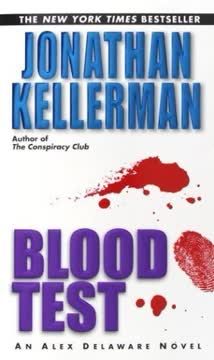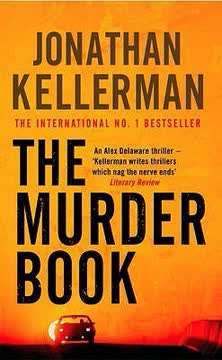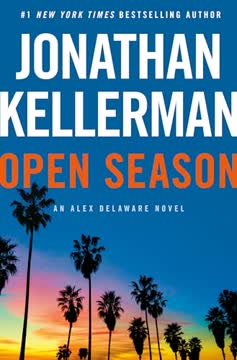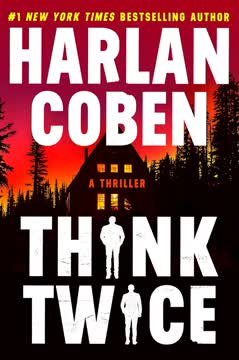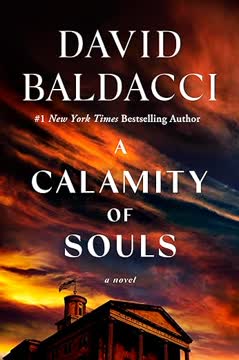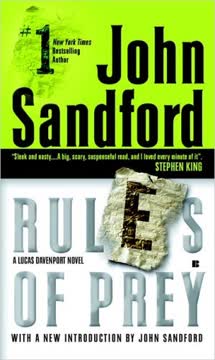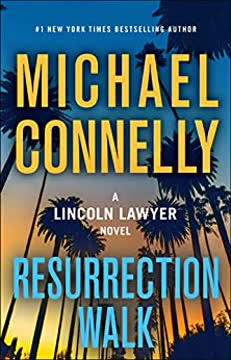Plot Summary
Morning Interrupted by Murder
Alex Delaware, a retired child psychologist, is enjoying a quiet morning at his Bel Air home when his friend, Detective Milo Sturgis, arrives with disturbing news. A psychiatrist, Morton Handler, and a woman named Elena Gutierrez have been brutally murdered. Milo seeks Alex's expertise to help a potential child witness, Melody Quinn, who might have seen the killers. Despite his reluctance, Alex agrees to assist, drawn by the mystery and the chance to help a child.
Milo's Unexpected Request
Milo shares the gruesome details of the murder scene, hoping to enlist Alex's help in interviewing Melody. The child lives in the same building as the victims and might have seen something crucial. Though retired, Alex is intrigued by the case and agrees to meet Melody, despite his initial hesitation. The conversation reveals Milo's trust in Alex's abilities and sets the stage for Alex's deeper involvement in the investigation.
A Child Witness Emerges
Alex visits Melody and her mother, Bonita Quinn, in their cramped apartment. He learns about Melody's hyperactivity and the medication she takes, which might affect her memory. Despite the challenges, Alex connects with Melody, using his skills to gently probe her memories. The session reveals little, but Alex is determined to help the child, sensing her vulnerability and the weight of the case.
The Doctor's Dark Secrets
As Alex delves into Handler's patient files, he discovers a pattern of unethical behavior and possible connections to the murder. Handler's notes reveal a disdain for his patients and a potential partnership with a former patient, Maurice Bruno, who is also found dead. The investigation suggests a web of deception and manipulation, with Handler at its center, challenging Alex to piece together the truth.
A Web of Deception
Alex's investigation leads him to La Casa de los Niños, a children's home with ties to the victims. He uncovers discrepancies in the staff's credentials and witnesses suspicious behavior, raising questions about the institution's role in the murders. As Alex navigates the complex web of relationships and secrets, he realizes the case is more intricate than it first appeared, with each discovery pulling him deeper into the mystery.
Secrets in the Shadows
Alex delves deeper into the mystery surrounding the murders of Morton Handler and Elena Gutierrez. He discovers a connection to a sinister group known as the Gentleman's Brigade, a cover for child molesters. The investigation leads him to the Hickle estate, where he encounters Kim Hickle, the widow of Stuart Hickle, who reveals her husband's involvement in the Brigade. She insists she was unaware of his activities, living in isolation to escape the shame and danger. Alex learns that the Brigade's reach extends far, with powerful men involved in the exploitation of children.
A Dangerous Revelation
Alex's investigation uncovers that the Brigade's activities were not limited to Los Angeles but had roots in Mexico, where Augustus McCaffrey, the head of La Casa de los Niños, previously operated. The Brigade's members include influential figures like Dr. Lionel Willard Towle and Judge Edwin Hayden. Alex realizes that the murders were orchestrated to silence those who threatened to expose the Brigade. The stakes are raised when Alex learns that Melody Quinn, a child witness, is in grave danger, having been abducted by the Brigade to prevent her from revealing what she knows.
The Web Unravels
Alex pieces together the connections between the Brigade members and the murders. He confronts Tim Kruger, a key player in the Brigade, who reveals the extent of the group's activities and the involvement of high-profile individuals. Kruger admits to his role in the abductions and murders, driven by fear and manipulation by McCaffrey. Alex learns that Melody is being held at La Casa de los Niños, and he must act quickly to save her. The revelation of the Brigade's activities threatens to bring down powerful men, but Alex is determined to see justice served.
Confrontation in the Dark
Alex, with the reluctant help of Dr. Towle, infiltrates La Casa de los Niños to rescue Melody. They find her drugged and restrained, a victim of the Brigade's cruelty. As they attempt to escape, they are confronted by McCaffrey, who plans to frame Alex for Melody's murder. A tense standoff ensues, with Alex using his wits to turn Towle against McCaffrey. In a moment of clarity, Towle realizes the truth about his past and his son's fate, leading to a violent confrontation that ends with McCaffrey's death. Melody is saved, but the cost is high.
Truths and Consequences
The aftermath of the confrontation sees the dismantling of the Gentleman's Brigade. Alex's actions expose the corruption and exploitation at the heart of the organization, leading to the arrest of its members. Dr. Towle, burdened by guilt and the revelation of his son's fate, faces the consequences of his actions. Alex reflects on the impact of the case, the lives saved, and the justice served. Melody is placed in a safe and loving environment, offering hope for her future. Alex's journey through the darkness of human depravity reaffirms his commitment to protecting the innocent.
Characters
Alex Delaware
Alex is a former child psychologist who retired early after a traumatic case. Despite his desire for a peaceful life, he is pulled back into the world of crime-solving by his friend Milo. His empathy and expertise with children make him a valuable asset in the investigation, though it also stirs up old anxieties and challenges his newfound tranquility. Alex's journey is one of moral conviction, as he confronts the darkness within human nature and fights to protect the vulnerable.
Milo Sturgis
Milo is a dedicated homicide detective and Alex's close friend. He is openly gay, which isolates him within the police force, but his skills and determination earn him respect. Milo's trust in Alex's abilities leads him to involve Alex in the case, hoping his friend's insights will uncover the truth behind the brutal murders.
Melody Quinn
Melody is a seven-year-old girl who may have witnessed the murders. She struggles with hyperactivity and is heavily medicated, complicating her ability to recall events. Alex's interactions with Melody reveal her innocence and the impact of her environment, highlighting the challenges of extracting reliable information from a traumatized child. Her abduction and rescue are central to the narrative, symbolizing the innocence threatened by the Brigade's actions.
Morton Handler
Handler is the murder victim whose unethical practices and possible criminal activities come to light posthumously. His disdain for patients and potential involvement in illegal schemes suggest a darker side, making him a complex figure whose life and death are central to the unfolding mystery.
Bonita Quinn
Bonita is Melody's mother, struggling to maintain stability in their lives. Her reliance on medication to manage Melody's behavior reflects her desperation and the pressures of their living situation. Bonita's interactions with Alex and Milo reveal her fears and the challenges of raising a child in a restrictive environment.
Tim Kruger
Kruger is a staff member at La Casa de los Niños, whose background and qualifications come under scrutiny. His role in the institution and interactions with the children raise suspicions, adding another layer to the complex web of relationships surrounding the case. His involvement in the murders stems from a desire to prove himself and escape his past.
Augustus McCaffrey
McCaffrey is the head of La Casa de los Niños and the mastermind behind the Gentleman's Brigade. His charm masks a ruthless and manipulative nature, using his position to exploit children and control those around him. McCaffrey's downfall comes from his overconfidence and underestimation of Alex's resolve.
Lionel Willard Towle
Towle is a respected pediatrician with ties to the Brigade. Haunted by his past and manipulated by McCaffrey, he struggles with his conscience. Towle's journey is one of redemption, as he confronts the truth about his son's fate and ultimately aids Alex in rescuing Melody, seeking to atone for his complicity.
Plot Devices
Psychological Insight
Alex's expertise in psychology is crucial in unraveling the case. His ability to connect with Melody and analyze Handler's files provides insights that traditional police work might miss. This plot device emphasizes the importance of understanding human behavior in solving complex crimes.
Misdirection and Deception
The investigation is filled with red herrings and false leads, challenging Alex and Milo to discern truth from deception. Characters' hidden motives and the intertwining of personal and professional lives create a labyrinthine mystery that requires careful navigation to solve.
Institutional Intrigue
La Casa de los Niños serves as a microcosm of larger societal issues, with its façade of benevolence masking potential corruption. The institution's role in the case highlights themes of power, exploitation, and the impact of systemic failures on vulnerable individuals.
Redemption and Guilt
The theme of redemption runs throughout the narrative, with characters like Towle and Kruger seeking to atone for their involvement in the Brigade's activities. Their journeys highlight the complexity of guilt and the possibility of redemption, adding depth to the story's moral landscape.
Analysis
"When the Bough Breaks" delves into the sinister depths of human nature, exploring themes of exploitation, corruption, and redemption. Through Alex Delaware's journey, the narrative examines the impact of systemic failures on vulnerable individuals and the moral complexities of seeking justice. The book highlights the importance of empathy and psychological insight in solving crimes, emphasizing the need to protect the innocent. The dismantling of the Gentleman's Brigade serves as a powerful reminder of the destructive power of secrets and the potential for redemption, offering hope amidst the darkness.
Last updated:
FAQ
Synopsis & Basic Details
What is When the Bough Breaks about?
- Retired Psychologist Drawn In: When the Bough Breaks introduces Alex Delaware, a brilliant but recently retired child psychologist, whose peaceful new life in Bel Air is shattered when his friend, Detective Milo Sturgis, requests his help on a gruesome double homicide. The victims are psychiatrist Morton Handler and his girlfriend, Elena Gutierrez.
- Child Witness at Core: The central mystery revolves around Melody Quinn, a traumatized seven-year-old who may have witnessed the murders. Alex's unique skills in communicating with children are crucial, pulling him into a complex investigation that uncovers a sinister network of child abuse and murder.
- Unraveling a Dark Conspiracy: What begins as a simple consultation quickly escalates into a deep dive into Handler's unethical past, a children's home called La Casa de los Niños, and a secret society known as the Gentleman's Brigade, forcing Alex to confront systemic corruption and personal danger to protect the innocent.
Why should I read When the Bough Breaks?
- Deep Psychological Thriller: Readers seeking a crime novel that delves beyond mere plot into the intricate workings of the human mind will find When the Bough Breaks compelling. Jonathan Kellerman, a clinical psychologist himself, imbues Alex Delaware with authentic psychological insight, making the unraveling of criminal motivations as fascinating as the pursuit of justice.
- Rich Character Development: The novel offers a nuanced exploration of its characters, particularly Alex's journey from burnout to renewed purpose, and Milo Sturgis's struggles with isolation and dedication. Their evolving friendship forms a powerful emotional core, providing a human anchor amidst the dark themes of child abuse and murder.
- Subtle Social Commentary: Beyond the thrilling mystery, the book subtly critiques societal issues, from the exploitation of vulnerable children in institutions to the moral compromises of the privileged class. It's a story that resonates with themes of justice, redemption and guilt, and the enduring fight against hidden evils, offering both suspense and profound reflection.
What is the background of When the Bough Breaks?
- 1980s Los Angeles Setting: The story is firmly rooted in 1980s Los Angeles, capturing the city's unique blend of opulence and hidden darkness, from the affluent hills of Bel Air to the gritty streets of Echo Park. This backdrop highlights the stark social contrasts and the pervasive sense of isolation that can exist even in a sprawling metropolis.
- Emerging Child Abuse Awareness: The novel taps into the growing public awareness and concern surrounding child abuse in the 1980s, particularly within institutional settings. The "Kim's Korner" scandal, which traumatized Alex and led to his retirement, reflects real-world anxieties about the vulnerability of children and the insidious nature of hidden predators.
- Critique of Professional Ethics: Kellerman, through Alex's internal monologues and interactions with characters like Dr. Towle and Morton Handler, explores the ethical ambiguities within the medical and psychological professions. It questions the boundaries of patient care, the potential for abuse of power, and the systemic failures that can allow unethical practices to flourish.
What are the most memorable quotes in When the Bough Breaks?
- "You mellow too much, you ripen and rot.": Milo Sturgis delivers this cutting line to Alex, challenging his early retirement and hinting at the psychological stagnation that can come from avoiding life's challenges. This quote encapsulates Alex's internal conflict and foreshadows his re-engagement with the world, driving the narrative forward.
- "The ego must maintain integrity. At all costs.": Repeated by Dr. Towle during his drug-induced regression, this phrase becomes a chilling mantra for his lifelong struggle to maintain a facade of normalcy and respectability, even as his actions betray a deeply fractured psyche. It highlights the theme of self-deception and the psychological cost of suppressing truth.
- "I learned early... that knowledge is power.": Reverend McCaffrey, in a moment of drunken megalomania, reveals this as his guiding principle, explaining his rise from janitor to powerful institution head. This quote underscores the novel's exploration of power dynamics, manipulation, and the weaponization of secrets against the privileged class he once served.
What writing style, narrative choices, and literary techniques does Jonathan Kellerman use?
- First-Person, Introspective Narrative: The story is told from Alex Delaware's first-person perspective, offering intimate access to his thoughts, anxieties, and psychological analyses. This narrative choice immerses the reader in Alex's intellectual process, making the investigation a journey of discovery not just for the characters, but for the reader as well.
- Vivid, Sensory Descriptions: Kellerman employs rich, detailed descriptions that engage all the senses, from the "fetid" darkness of the canyons to the "sour with the aroma of decomposition" in the greenhouse. This vivid imagery creates a palpable atmosphere, enhancing the suspense and grounding the often-disturbing events in a stark reality.
- Psychological Insight and Dialogue: The novel excels in its psychological realism, particularly in its portrayal of trauma, addiction, and manipulation. The dialogue is sharp, often revealing subtext and unspoken motivations, reflecting Kellerman's expertise in human behavior and making character interactions feel authentic and deeply revealing.
Hidden Details & Subtle Connections
What are some minor details that add significant meaning?
- Melody's Shrunken Head: The "shrunken head" trinket given to Melody by her father, Ronnie Lee Quinn, initially seems like a bizarre gift. Its later abandonment by Melody, after her abduction, subtly signifies her psychological break from her father and her recognition of his malevolent nature, marking a crucial step in her healing and understanding of his role in the crimes.
- Brindamoor Island Street Names: The streets on Brindamoor Island—Charlemagne, Alexander, Suleiman—are named after historical conquerors. This seemingly innocuous detail subtly underscores the insular, self-important, and predatory nature of the island's wealthy inhabitants, including Towle, Hickle, and Hayden, who saw themselves as above the law and capable of "conquering" any obstacle.
- Towle's Office Decor vs. Photo: The contrast between Dr. Towle's "mushy" waiting room decor and the stark, almost shrine-like photograph of his deceased wife and son in his consultation office is telling. It highlights his professional facade of warmth versus the deeply personal, unresolved trauma that defines his private world, foreshadowing his susceptibility to McCaffrey's blackmail.
What are some subtle foreshadowing and callbacks?
- Milo's Hickle Suicide Doubt: Early in the novel, Milo casually mentions his gut feeling that Stuart Hickle's death "stunk to high heaven" and wasn't a suicide, a detail Alex initially dismisses. This serves as a subtle but powerful piece of foreshadowing, later confirmed when Tim Kruger reveals Hickle was murdered by Towle and Hayden to prevent exposure of the Gentleman's Brigade.
- Towle's "Spells" and Self-Medication: Dr. Towle's reliance on "pills" to manage his "spells" and maintain lucidity is introduced early, hinting at a deeper psychological fragility. This foreshadows his eventual breakdown and confession, revealing that his carefully constructed professional persona is maintained by a cocktail of drugs, directly linked to his past trauma and complicity.
- Melody's "Dark Men" and Ronnie Lee: Melody's initial, vague description of "two, maybe three dark men" seen during the Handler murder is a recurring motif. This seemingly unreliable testimony is later validated when Tim Kruger describes the killers (Halstead and Earl/Ronnie Lee) as "wearing black, like demons," and Alex realizes Melody's "dark men" included her own father, whom she recognized from a photograph.
What are some unexpected character connections?
- Towle, Hickle, and Hayden's College Ties: The revelation that Dr. Lionel Willard Towle, Stuart Hickle (the pedophile), and Judge Edwin Hayden were not only college friends but a tight-knit trio from the exclusive Brindamoor Island is a major, unexpected connection. This deepens the conspiracy, showing a long-standing bond rooted in shared privilege and dark secrets, rather than random association.
- McCaffrey's Janitorial Past: Augustus McCaffrey, the charismatic head of La Casa, is unexpectedly revealed to have been a janitor for the Hickle family on Brindamoor Island. This transforms his motivation from simple greed to a complex, deep-seated revenge against the wealthy elite who mistreated him, adding a powerful, class-based dimension to his villainy.
- Ronnie Lee Quinn as "Earl": Melody's absent father, Ronnie Lee Quinn, is unexpectedly identified as "Earl," the "gimp" and McCaffrey's enforcer from Mexico. This connection links Melody directly to the core of the conspiracy through her own family, highlighting the tragic intertwining of personal history with the broader criminal enterprise.
Who are the most significant supporting characters?
- Professor Garth Van der Graaf: This eccentric, hunchbacked history professor at Jedson College is far more than comic relief. He serves as the crucial historical archive, providing Alex with the vital, long-buried connections between Towle, Hickle, and Hayden, and revealing the dark underbelly of Brindamoor Island. His character is key to unlocking the past.
- Kim Hickle: Stuart Hickle's widow, initially appearing as a frightened recluse, becomes a pivotal source of information. Her testimony about Stuart's non-suicide and his hints about the "Gentlemen" provides Alex with the first concrete evidence that the murders are part of a larger cover-up, despite her own complex denial and fear.
- Raquel Ochoa: Elena Gutierrez's best friend, Raquel, initially hostile and guarded, eventually becomes a vital ally. Her emotional vulnerability and deep loyalty to Elena allow Alex to gain crucial insights into Elena's life, her relationship with Handler, and the circumstances leading to her death, bridging the cultural and emotional gaps Alex faces.
Psychological, Emotional, & Relational Analysis
What are some unspoken motivations of the characters?
- McCaffrey's Vengeful Power Drive: Beyond the obvious financial gain, McCaffrey's deepest unspoken motivation is a profound, class-based revenge against the wealthy elite of Brindamoor Island. His past as a mistreated janitor for the Hickle family fuels his desire to control and exploit the very people who once looked down on him, using their "strange ways" as leverage for his own twisted empire.
- Kruger's Craving for Acceptance: Tim Kruger, despite his athletic prowess and privileged background, harbors an unspoken need for acceptance and validation, especially after being "blackballed" for the Jeffrey Saxon incident. This vulnerability makes him susceptible to McCaffrey's manipulation, as McCaffrey offers him a sense of purpose and belonging within the "Gentleman's Brigade," even if it means complicity in heinous crimes.
- Towle's Guilt-Driven Complicity: Dr. Towle's primary unspoken motivation for his long-standing complicity with McCaffrey is profound guilt over the accidental deaths of his wife and son. McCaffrey exploited this trauma, convincing Towle he was responsible, thereby binding him through blackmail and ensuring his silence and cooperation in the child abuse ring, as a form of penance.
What psychological complexities do the characters exhibit?
- Alex's Zeigarnik Effect and Burnout: Alex Delaware grapples with the "Zeigarnik effect"—the psychological tension of unfinished business—which pulls him back into the case despite his early retirement due to burnout. His drive to solve the murders is not just altruism but also a complex need to re-engage with a sense of purpose, confronting his own past trauma from the Hickle case.
- Towle's Dissociative Episodes: Dr. Towle exhibits complex dissociative episodes, particularly when under stress or off his medication, where he regresses into childlike speech and fragmented memories. This psychological defense mechanism allows him to compartmentalize his horrific past actions and maintain a functional, respected persona, highlighting the extreme measures some take to cope with unbearable guilt.
- Kim Hickle's Denial and Isolation: Kim Hickle's psychological complexity lies in her profound denial regarding her husband's pedophilia and her subsequent self-imposed isolation. Her narrative reveals a woman who, despite being a victim of circumstance and manipulation, actively chose to remain ignorant, illustrating the psychological toll of shame and the desperate need to escape a horrifying reality.
What are the major emotional turning points?
- Alex's Decision to Defy Milo: A significant emotional turning point for Alex occurs when he witnesses Rodney Broussard's fear of doctors at La Casa and decides to pursue the McCaffrey connection, despite Milo's explicit instruction to drop it. This moment marks Alex's full re-engagement with his professional identity and moral conviction, prioritizing the welfare of vulnerable children over personal safety or professional boundaries.
- Towle's Breakdown and Confession: Dr. Towle's emotional climax in the car, triggered by Alex's relentless questioning and the withdrawal of his medication, is a pivotal turning point. His fragmented confession about accidentally killing his wife and son, and McCaffrey's subsequent manipulation, reveals the deep-seated trauma that has driven his complicity, transforming him from a villain to a tragic figure seeking a desperate form of redemption.
- Raquel Ochoa's Trust in Alex: Raquel's initial hostility towards Alex, rooted in her distrust of authority and her grief for Elena, gradually gives way to a profound emotional trust. Her decision to share intimate details about Elena's life and her family's struggles, culminating in the emotional breakdown in the restaurant, signifies a breakthrough in rapport that is crucial for Alex's understanding of Elena's motivations and the broader context of the murders.
How do relationship dynamics evolve?
- Alex and Milo: From Professional to Deeply Personal: Their relationship evolves from a professional consultation to a profound, mutually supportive friendship. Milo's initial request for Alex's "professional services" quickly deepens as they share vulnerabilities, with Milo confiding his homosexuality and Alex revealing his burnout. This bond becomes a cornerstone of the narrative, highlighting loyalty and trust in a corrupt world.
- Alex and Robin: Strain and Renewed Commitment: Alex's renewed involvement in the dark world of crime strains his relationship with Robin, who fears his return to his "old self." Her initial frustration and worry ("I'm starting to worry about you, sweetie") evolve into a conscious decision to support him, demonstrating a mature commitment that acknowledges his need for purpose while setting boundaries for her own well-being.
- Towle and McCaffrey: Blackmail to Betrayal: The dynamic between Dr. Towle and Reverend McCaffrey is initially one of blackmail and subservience, with McCaffrey exploiting Towle's guilt. This power imbalance eventually shifts as Towle, confronted with the truth about his son and the imminent threat to Melody, betrays McCaffrey, leading to a violent, fatal confrontation that shatters their long-standing, toxic relationship.
Interpretation & Debate
Which parts of the story remain ambiguous or open-ended?
- Melody Quinn's Long-Term Recovery: While Melody is rescued and placed in a loving foster home, the story leaves the full extent of her psychological recovery ambiguous. The trauma of her abduction, her mother's death, and her father's role in the crimes suggest a long and complex healing process, leaving readers to ponder the lasting impact on her young life.
- The Full Scope of the Gentleman's Brigade: The novel exposes a significant portion of the Gentleman's Brigade, including high-profile members, but the exact number and the full extent of their activities remain somewhat open-ended. While justice is served for the immediate crimes, the systemic nature of such a network implies that not all "monsters" are caught, leaving a lingering sense of unease about hidden evils.
- Alex's Future Balance: Alex's journey ends with a renewed sense of purpose, but the question of his long-term balance between his drive for justice and his personal life with Robin remains open. His tendency to become "a man possessed" by cases suggests a potential for future burnout or strain on his relationships, inviting readers to consider the sustainability of his chosen path.
What are some debatable, controversial scenes or moments in When the Bough Breaks?
- Milo's Execution of Judge Hayden: Detective Milo Sturgis's decision to execute Judge Edwin Hayden, making it appear as a suicide, is a highly controversial moment. This act of vigilante justice, driven by Milo's personal disgust and his belief that Hayden would escape true punishment, sparks debate about the ethics of law enforcement, the limits of the justice system, and whether some crimes warrant extra-legal retribution.
- Alex's Manipulative Interrogations: Alex Delaware employs manipulative tactics, such as lying about his identity to Margaret Dopplemeier and exploiting Rafael's drug addiction, to extract information. While these actions are justified by the urgency of the case and the heinousness of the crimes, they raise ethical questions about the boundaries of psychological practice and the moral compromises made in the pursuit of truth.
- The Portrayal of Child Abuse Motivations: The novel delves into the dark motivations behind child abuse, particularly through McCaffrey's and Towle's backstories. The depiction of the "Gentleman's Brigade" as a network of powerful, privileged men who exploit vulnerable children, and the exploration of their psychological pathologies, can be controversial for its unflinching portrayal of depravity and its implications about societal corruption.
When the Bough Breaks Ending Explained: How It Ends & What It Means
- Confrontation and Deaths: The climax sees Alex, with Towle's reluctant help, rescue Melody from La Casa. They are confronted by McCaffrey, who plans to frame Alex for Melody's murder. In a pivotal moment, Alex exposes McCaffrey's manipulation of Towle, leading Towle to shoot McCaffrey. McCaffrey is then killed by Delano Hardy, while Towle dies from his own wounds. Judge Edwin Hayden commits suicide when confronted by Milo, who orchestrates the scene to appear as such.
- Justice Served, Lives Saved: The ending signifies a triumph of justice, as the Gentleman's Brigade is dismantled, and its high-profile members are exposed and arrested. Melody Quinn is rescued and placed in a safe, loving foster home, offering a hopeful future for a child who endured immense trauma. Alex, though physically injured, finds a renewed sense of purpose and a deeper commitment to his relationship with Robin.
- The Cost of Secrets and Redemption: The resolution underscores the destructive power of hidden secrets and the possibility, however painful, of redemption. Towle's final act, driven by the truth about his son, represents a tragic atonement. The ending ultimately affirms the resilience of the human spirit and the enduring importance of fighting for the vulnerable, even when it demands personal sacrifice and confronts the darkest aspects of human nature.
Review Summary
When the Bough Breaks introduces psychologist Alex Delaware and detective Milo Sturgis in a gripping mystery involving child abuse. Readers praise Kellerman's character development, psychological insights, and plot twists, though some find pacing issues. The 1985 novel won awards and launched a long-running series. While dated in some aspects, it tackles dark themes with empathy. Most reviewers enjoy the protagonist's analytical approach and his friendship with Milo. Some criticize the ending and dated portrayals, but overall, it's considered a strong debut that hooks readers into the series.
Alex Delaware Series
Similar Books
Download PDF
Download EPUB
.epub digital book format is ideal for reading ebooks on phones, tablets, and e-readers.

